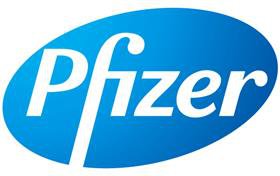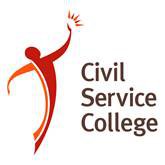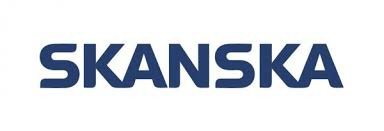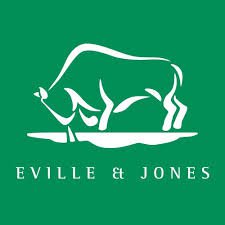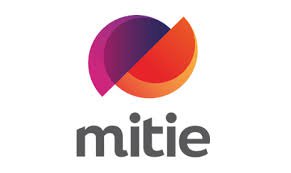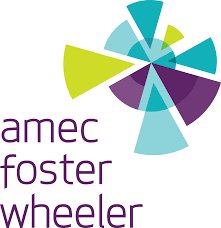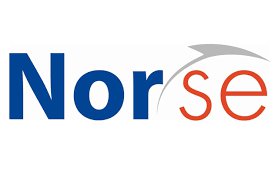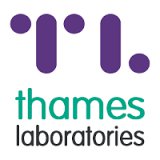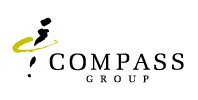BID MANAGEMENT MODULES

BID/NO BID - OPPORTUNITY EVALUATION
Making the right commercial decisions in the first place.
Bid/No Bid is the detailed examination of a bid opportunity from a range of perspectives, which, if carried out correctly, will ensure that resources (time and money) are not being wasted working on bids that unlikely to be winners. Careful understanding of the Bid/No Bid process and properly applying it will increase the resources available for working on bids that stand a better than even chance of being successful.

BID KICK OFF MEETINGS
Running a valuable and effective meeting to set the bid strategy off to a winning start.
Bid kick-off meetings are required to have a very specific agenda and to involve as many of the bid contributors as possible. A well-managed and attended meeting will lay the right foundations for the start of a winning bid.
This module examines a typical agenda and how the meeting is communicated, run and what the outcomes should be.

MANAGING A BID REVIEW
How reviews are planned, initiated and delivered.
A valuable and exemplary bid review is a process that provides an objective reality check from a fresh, unbiased, customer-based viewpoint.
Planned and executed correctly, an excellent review can turn an average bid (i.e. a losing bid) into a likely winner (or, at the very least, strong contender). This module takes you through the process, step by step.
BID STRATEGY DEVELOPMENT MODULES
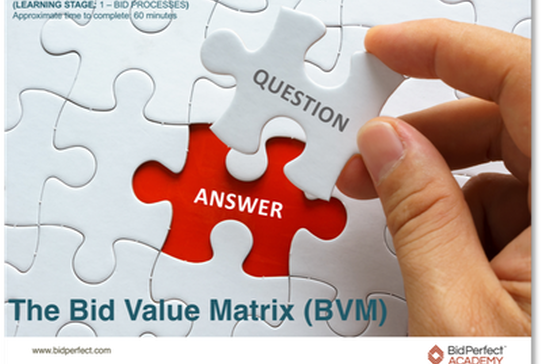
BID VALUE MATRIX
How to create an effective project plan including the Bid Value Matrix (BVM).
All bids (especially ones with multiple contributors or stakeholders) need to be managed and communicated through a project framework that is flexible and can be easily updated. The Bid Value Matrix (BVM) achieves these objectives and promotes collaborative behaviour. A well managed BVM is also the key to establishing a 360 degree of the entire bid project.
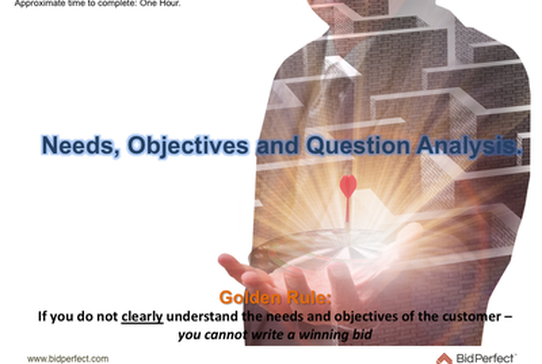
NEEDS, OBJECTIVES AND QUESTION ANALYSIS
Establishing the key needs to be met and the additional value.
The unstated needs. How to analyse a question and capture its component elements. Identifying points of empathy. Research feeds directly into your understanding of their needs and objectives. A clear and unequivocal understanding of your customers requirements (both explicit and implicit) is critical to writing a winning bid. This module also demonstrates how to deconstruct a question in an ITT/RfP to ensure you have an intimate understanding of what you need to do to deliver a high scoring answer.

BUSINESS INTELLIGENCE
How to obtain business intelligence on your client and deploying the information.
Customer research or the gathering of business intelligence is intended to increase your knowledge of the client beyond what is contained in the ITT/RfP. The module looks at where you can obtain information and what data you should be taking note of. You will need to expand your understanding of the client's wider business goals and how you can develop your empathy strategy.
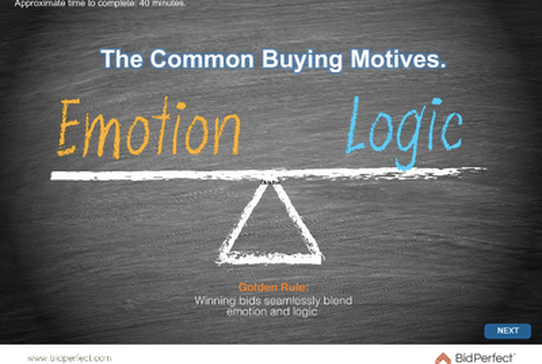
COMMON BUYING MOTIVES
Emotional and rational procurement and evaluation drivers. Includes the Common non-buying motives.
The Common Buying Motives module examines the reasons why an evaluator will connect with your bid on an emotional level but will also have access to the logic of making a decision in your favour. These are referred to as the Rational Common Buying Motive (RCBM) and the Emotional Common Buying Motives (ECBM). As with any proposition, there is a flip side which are the Non-Buying motives. This module also examines those.

WIN THEMES
RFP/ITT analysis. The golden threads running through your bid designed to continually reinforce your winning credentials.
Win themes are the DNA of your bid. These are the key reasons the client will buy from you and they should be consistently referenced throughout the bid response. This module also links back to previous modules (such as working with SMEs, the Kick-Off Meeting and understanding objectives/needs). The bid writer's objective is to weave into the narrative consistent reinforcement of why you are the right people to buy from.
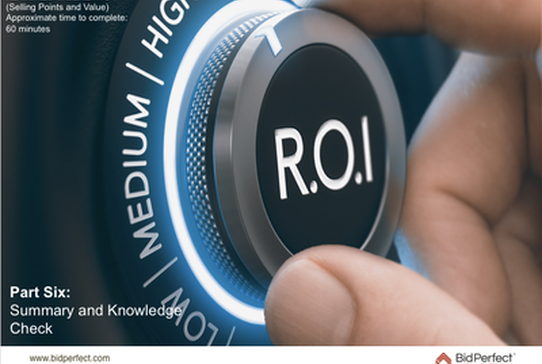
FEATURES V BENEFITS
Quantifying a value outcome or return on investment. Includes Linked Benefits and the Mitigation of Risk.
Features are the things about your company which are generic and which are likely to be matched by your competitors and will certainly be included in their bid. This are aspects such as experience, personnel, scope of service, locations, skills, etc. Benefits are what your customer can expect to achieve as a value as a result of these features of your organisation. Linked benefits are the knock-on effect of something you will do or them and the risk factor is how likely/unlikely it is that they will achieve the value you are promising them.
Everything you sell (whether a service or goods) is comprised of four basic building blocks or selling point types. BSP - The Basic Selling Point, KSP - The Key Selling Point, ISP - The Innovative Selling Point and USP - The Unique Selling Point. This module looks at the effectiveness of each type of selling point and gives you examples of them.
WRITING BIDS
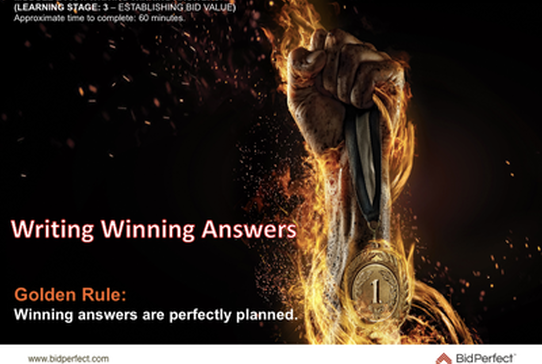
WRITING WINNING ANSWERS
How to differentiate winning bid content (from average or losing content).
Answers need to follow a specific path which accommodates all the elements that will ensure it achieves the maximum marks available. This includes correctly identifying the objectives, ensuring there is clearly defined value and high quality evidence. The module guides you through this.
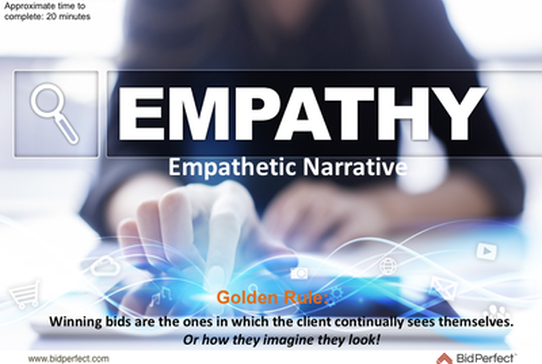
EMPATHETIC NARRATIVE
Techniques for ensuring the reader stays engaged.
In this module we explain how you should address the reader and involve them in your narrative. Bids that fail to do this are little more than expanded brochures. You should be talking about them and to them. In this module, you will learn ways of doing this.
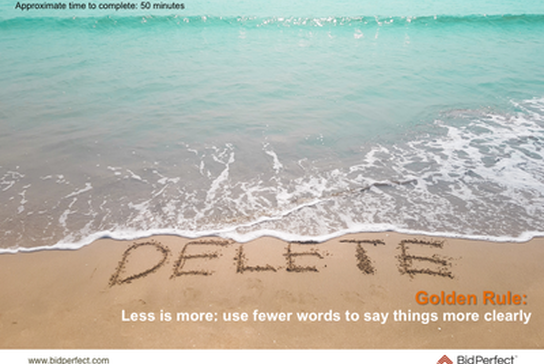
LEAN WRITING
Techniques for managing word counts and cutting down unnecessary text
Lean writing is a technique for reducing the amount of words you use to make your point and deliver the required information. This really is a case of 'less is more'. Lean writing makes the task of reading your bid easier and helps your key points to stand out.

EVIDENCE IN A BID
Making your bid compelling and underlining your competence to deliver
Everything you claim to deliver in your bid requires some form of evidence. However, different types of evidence has different levels of impact and believability. Here we examine the typical evidence required by evaluators and how you can define how effective your evidence is.
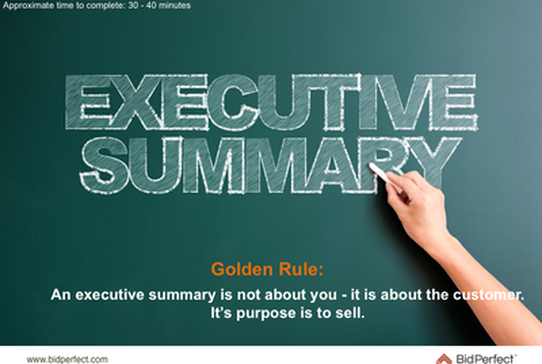
EXECUTIVE SUMMARIES
The planning, the key elements and the writing of a winning executive summary.
An executive summary, or management summary, is a short document or section of a bid document that summarises your proposition in such a way that readers can rapidly become acquainted with a large body of material without having to read it all. It is also the first part of your bid that will be read and therefore it is the evaluators introduction to you. If you get this right, it will put them in a buying frame of mind. If you get it wrong, they are immediately harbouring negative thoughts. This is a critical module for any bid writer.
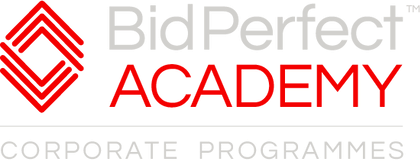
Corporate e-learning solutions available via our learning portal or can be loaded onto your own learning platform (LMS)
We also develop bespoke e-learning courses for customers to mirror their specific bid environments
Don't know where to start?
WHY BID PERFECT?
An investment in our training courses represents outstanding value for money.
We know that if you look hard enough you will find someone offering bid 'training' for £49 - which means you get to sit for a couple of hours in a roomful of 50 other people, all struggling to take notes by leaning on the arms of their chairs.
Our training fees include a hard-backed workbook, all course materials, plus lunch and refreshments.
The workshops take place in professional conference venues, where you will have plenty of workspace, and they are delivered by two experienced and engaging trainers.
Each course is limited in numbers, which ensures maximum attention, interaction and therefore understanding and retention of knowledge.
We offer discount packages for more than one delegate from a company.





